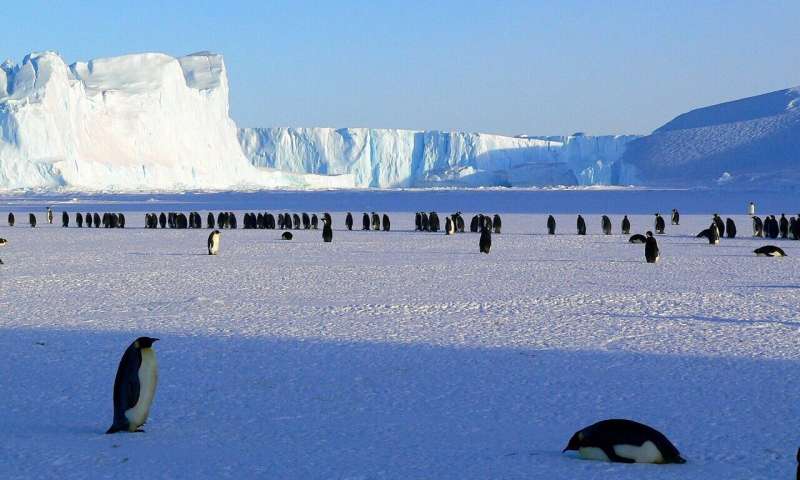Some see Antarctica as 'last chance' destination. For others, it's a backdrop

In a new study, researchers found a significant reason why many people travel to Antarctica is to socialize—to celebrate anniversaries, honeymoons or to spend time with family for a holiday—rather than because of a particular interest in the land and its wildlife.
The finding raises questions about the effectiveness of the conservation appeals and educational efforts for this emerging group of Antarctic tourists.
"Some people go to Antarctica for learning and experience, some people go to fulfill a lifetime dream, and some people go there as an adventure—they have been to many places, but they haven't been there," said study co-author Yu-Fai Leung, professor of parks, recreation and tourism management at North Carolina State University. "The social bonding group's motivations were interesting. They didn't mention anything about penguins or seeing other wildlife as a principal motivation; they're going for a vacation, birthday or anniversary celebrations, and they chose Antarctica as the backdrop."
Researchers launched the pre-pandemic study on tourism to Antarctica as travel to the continent has grown and diversified. The pre-pandemic, 2019-2020 tourist season saw more than 74,000 travelers—double the number of travelers seen five years prior. While tourism can be a tool to inspire people to become ambassadors for conservation for Antarctica—a fragile ecosystem facing crumbling glaciers, invasive species, and wildlife diseases—it also can create challenges.
"During the last two decades, a lot of new, different activities have been introduced in Antarctica that are drawing the interest of a bunch of people," said the study's lead author Daniela Cajiao, a former visiting scholar at NC State and former graduate student at the Universidad Autónoma de Madrid. "There are also new ways of traveling there. This is diversifying how you can access Antarctica, but also the profile of the tourists who visit."
To understand tourists' motivations, researchers surveyed people before and after they traveled by ship or airplane to Antarctica during the 2019-20 season. They found four main motivations for tourists traveling to Antarctica: experience and learning (31%), social bonding (28%), adventure (23%), or to take a trip of a lifetime (17.5%).
They observed people in the "social bonding" and "trip of a lifetime" groups who saw Antarctica as a last-chance tourism destination; a finding that researchers have also documented with other sites endangered by climate change, like the Great Barrier Reef and the Arctic.
"Now that we have more people traveling to Antarctica for adventure or social bonding, how do we think about communicating with these tourists?" Cajiao said. "They may not want to attend all lectures. We need to think about how we can better deliver conservation and environmental messages so that any changes in people's environmental concerns or behaviors last in the long term."
When they analyzed whether tourists in certain groups were more or less likely to have learned something from the trip—or perceived they learned something—they found tourists in the "trip of a lifetime" group were more likely to have higher perceptions of learning. Tourists in the "experience and learning" group had the highest overall average score for actual learning.
Surprisingly, they also found there was a relationship between tourists' perception of how much they learned, and their intentions to change their environmental behaviors.
"We found that it's not just about whether you actually learned facts or lessons about Antarctica, the continent, or the ecosystem," Leung said. "It's also about how much you feel you learned. This suggests that perception means a lot to people; it's part of the experience.
"If you feel you got something from the learning experience, then it will more likely change you and what you do after the trip. That has important implications for educators, communicators and tour operators."
Researchers said getting a large or representative sample on Antarctic tourists is extremely difficult, and this study was no exception. They want to extend their study to continue to examine tourist types and relationships.
They also said they want to study actual behavior changes in future work, as well as look at Antarctic tourism after the pandemic slowdowns and closures. Leung said that while tourism may not have full recovered to pre-pandemic levels yet, they expect it will.
"We are curious to see how this shifts again after COVID," Cajiao said. "Maybe people see the world a little bit differently."
The study, "Tourists' motivations, learning and trip satisfaction facilitate pro-environmental outcomes of the Antarctic tourist experience," was published in the Journal of Outdoor Recreation and Tourism.
More information: Daniela Cajiao et al, Tourists' motivations, learning, and trip satisfaction facilitate pro-environmental outcomes of the Antarctic tourist experience, Journal of Outdoor Recreation and Tourism (2022). DOI: 10.1016/j.jort.2021.100454
Provided by North Carolina State University




















